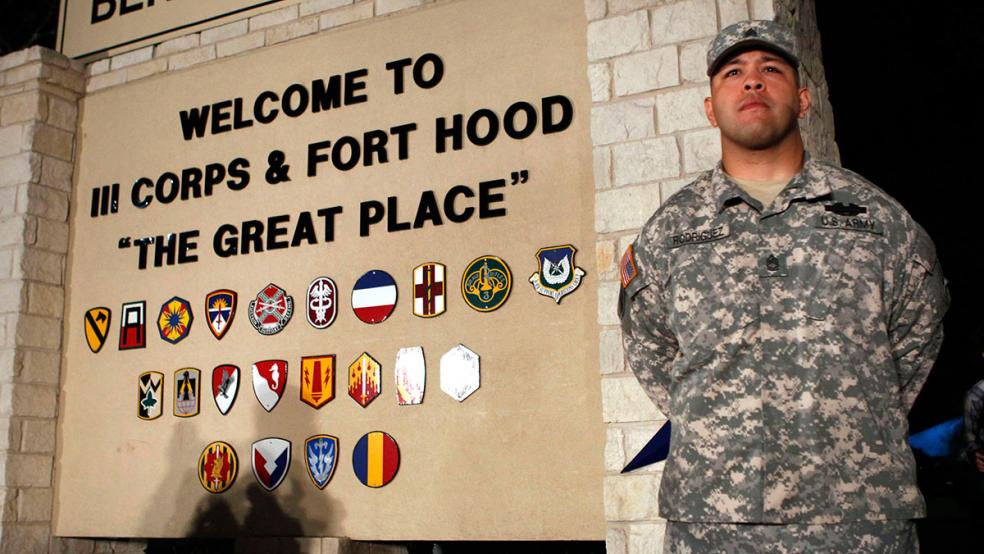Being a soldier is hard, no question. Managing a military family's finances is no picnic either. But just in time for Veterans Day, efforts are underway to expand financial protections for service members.
The Military Lending Act, which took effect in 2007, places some limits on small-dollar, short-term lending practices, but lenders have found many ways around the law. The Defense Department has proposed beefing up the act, known as the MLA, so that it applies to "all forms of payday loans, vehicle title loans, refund anticipation loans, deposit advance loans, installment loans, unsecured open-end lines of credit, and credit cards," the announcement said.
Related: 5 Ways Service Members Feel Outgunned Financially
The signs of stress on military families are abundant. Many service members are anxious about the possible effects of sequestration (or spending cuts) and defense downsizing, with 55 percent of military families worried about job security, compared with 6 percent of the general population, according to a survey released in September by First Command Financial Services.
Unemployment among military spouses is also well above the national average, with 30 percent joblessness among spouses aged 18 to 24, further stretching military families' budgets. Partly that's because military families relocate much more than the average family. Holly Petraeus, former wife of retired Gen. David Petraeus, said in congressional testimony that their family moved 24 times in 37 years.
Members of the military are also preyed upon by fraudsters using their own military connections to establish trust. The Securities and Exchange Commission said last year it halted an alleged scheme created by a former Marine whom it accused of investing only a fraction of the money he received from would-be clients, spending the rest on fancy cars, a Hollywood mansion and more.
Not surprisingly, service members, particularly those who are younger or more junior, are more likely than the general population to take out high-cost, short-term loans and credit lines, especially since payday lenders, pawn shops, and used car dealers often line the streets outside military installations.
Related: Bad Credit Makes Everything Harder - How to Fix It
In a Defense Department survey, 41 percent of enlisted service members said they or their significant others had used small-dollar lending in the previous 12 months, including payday loans, loans from pawn shops, advances on bank deposits and cash advances on credit cards. Among all members of the military, 35 percent used those products, versus 30 percent of the general population, according to the Financial Industry Regulatory Authority. Millennials in the military were more likely to go that route than their older counterparts.
"Sometimes it's easier for those service members as they taxi off post to run into the payday lender and find their financing that way. They just don't have the information to know what's available to them," said Jerry Quinn, manager of Wells Fargo's Military Affairs Program and an Army reservist. The military does offer financial education at certain times, like when a unit mobilizes, he said, but at that point, soldiers have many other things on their minds. "Worrying about their car payments might not be their top priority when they are counting rounds and making sure their protective vest is set up right," he said.
The Military Lending Act is supposed to protect members of the military from overly costly short-term loans. But as it stands now, that law only applies to three narrowly defined types of loans, like payday loans with terms of 91 days or less and for $2,000 or less.
That means a lender can offer a slightly longer or larger loan at a higher rate. Another way around the Lending Act limits is with things like deposit advances, where a bank offers a high-interest-rate advance on a paycheck that is coming in via direct deposit.
Related: 7 Ways to Make the Most of Your 401(k)
That corner of the credit market has in the past included some big names. Wells Fargo, Fifth Third, and U.S. Bank offered credit like deposit advances to military members and other consumers until regulators late last year imposed certain limits on that type of lending and they exited the business.
A number of financial services industry associations believe the current proposal to expand the Military Lending Act takes the wrong approach, contending that the new regulations would place unduly heavy burdens on banks and credit unions.
"It's important that regulations protect military service members against predatory loans, as the Military Lending Act intended," said Nessa Feddis, senior vice president for consumer protections and payments at the American Bankers Association. "It's equally important that they not cause all service members, their spouses and their dependents to lose access to valuable mainstream lending products."
But consumer groups like the Consumer Federation of America, the National Consumer Law Center and Americans for Financial Reform all support the expansion.
Rep. Tammy Duckworth, D-Ill., an early proponent of the changes and herself an Iraq War veteran, is sending a letter signed by members of both parties to Defense Secretary Chuck Hagel arguing that "the proposed rule provides the inclusive definition of consumer credit necessary to ensure that all service members are covered by the consumer protections envisioned by Congress in 2007 and will help preserve our force's readiness."
The public comment period on the proposal ends on Nov. 28, and the Department of Defense will issue the final rule after reviewing the comments. If Duckworth has her way, the weeks and months following this Veterans Day could bring members of the military a little more than ceremonies and wreaths.
This article originally appeared in CNBC.
Read more at CNBC:
Obama administration seeks more protection for military borrowers
Military preparedness meets its match: Finances
Military families' hidden risk: finances



